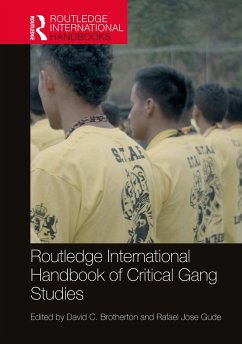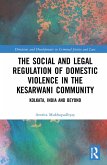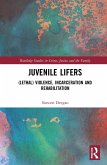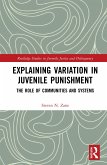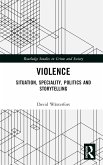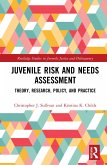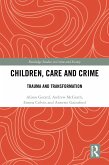Routledge International Handbook of Critical Gang Studies
Herausgeber: Brotherton, David C; Gude, Rafael Jose
Routledge International Handbook of Critical Gang Studies
Herausgeber: Brotherton, David C; Gude, Rafael Jose
- Gebundenes Buch
- Merkliste
- Auf die Merkliste
- Bewerten Bewerten
- Teilen
- Produkt teilen
- Produkterinnerung
- Produkterinnerung
Authoritative, multi-displinery and international, this handbook defines the new theoretical and empirical traditions of Critical Gang Studies, taking into account the gang as a socio-cultural formation, its various forms and stages of development, the role of race and political economy, and the contradictory impact of repressive policies.
Andere Kunden interessierten sich auch für
![The Social and Legal Regulation of Domestic Violence in The Kesarwani Community The Social and Legal Regulation of Domestic Violence in The Kesarwani Community]() Amrita MukhopadhyayThe Social and Legal Regulation of Domestic Violence in The Kesarwani Community191,99 €
Amrita MukhopadhyayThe Social and Legal Regulation of Domestic Violence in The Kesarwani Community191,99 €![Juvenile Lifers Juvenile Lifers]() Simone DeeganJuvenile Lifers179,99 €
Simone DeeganJuvenile Lifers179,99 €![Sentencing Youth to Life in Prison Sentencing Youth to Life in Prison]() Kathi Milliken-BoydSentencing Youth to Life in Prison169,99 €
Kathi Milliken-BoydSentencing Youth to Life in Prison169,99 €![Explaining Variation in Juvenile Punishment Explaining Variation in Juvenile Punishment]() Steven N ZaneExplaining Variation in Juvenile Punishment190,99 €
Steven N ZaneExplaining Variation in Juvenile Punishment190,99 €![Violence Violence]() David WästerforsViolence191,99 €
David WästerforsViolence191,99 €![Juvenile Risk and Needs Assessment Juvenile Risk and Needs Assessment]() Christopher J SullivanJuvenile Risk and Needs Assessment190,99 €
Christopher J SullivanJuvenile Risk and Needs Assessment190,99 €![Children, Care and Crime Children, Care and Crime]() Alison GerardChildren, Care and Crime169,99 €
Alison GerardChildren, Care and Crime169,99 €-
-
-
Authoritative, multi-displinery and international, this handbook defines the new theoretical and empirical traditions of Critical Gang Studies, taking into account the gang as a socio-cultural formation, its various forms and stages of development, the role of race and political economy, and the contradictory impact of repressive policies.
Produktdetails
- Produktdetails
- Verlag: Taylor & Francis Ltd (Sales)
- Seitenzahl: 724
- Erscheinungstermin: 29. Juli 2021
- Englisch
- Abmessung: 244mm x 170mm x 40mm
- Gewicht: 1388g
- ISBN-13: 9781138616110
- ISBN-10: 1138616117
- Artikelnr.: 69944381
- Verlag: Taylor & Francis Ltd (Sales)
- Seitenzahl: 724
- Erscheinungstermin: 29. Juli 2021
- Englisch
- Abmessung: 244mm x 170mm x 40mm
- Gewicht: 1388g
- ISBN-13: 9781138616110
- ISBN-10: 1138616117
- Artikelnr.: 69944381
David C. Brotherton is Professor of Sociology at the John Jay College of Criminal Justice and the Graduate Center at the City University of New York, where his research on youth resistance, marginalization and gangs led to the Street Organization Project in 1997. He has received numerous research grants from both private and public agencies and has published widely in journals, books, newspapers and magazines. Dr Brotherton currently co-directs the Social Change Project at the John Jay College of Criminal Justice and edits the Transgressive Studies book series at Temple University Press. In 2011 he was named Critical Criminologist of the Year and in 2015 was the recipient of the Praxis Award for contributions to social activism and justice. Rafael Jose Gude is a Research Fellow with the Social Change and Transgressive Studies Project at John Jay College of Criminal Justice, CUNY. He has done extensive fieldwork with gangs in both El Salvador and Ecuador, where much of his research has focused on developing viable alternatives to the war on gangs. He has an MPhil in Latin American Studies from the University of Oxford.
Critical Theories of the Gang 1.Utilizing Southern Criminology in the
Global North: Applying Southern Criminology to Over-standings of English
Gang Research 2.States of Emergency: Gangs, Benjamin, and the Challenge to
Modern Sovereignty 3.The Birmingham School and Critical Gang Studies 4.The
Gang as Secret Society 5.On Being Affected: Love, Law & Submission Among
Gangsters 6.The Catholic Church and the Gangs: Toward a Liberationist
Critique of Gang Violence 7.Gangs, space and the state: bringing Henri
Lefebvre's spatial theory to critical gang studies Critical Methodologies
8.Cultural Criminology and Gangs: Street Elitism and Politics in Late
Modernity 9.Interviewing Gang Members: A Note on Research Design 10.New
Standards for Social Practice Ethics? Researching Processes of Gang Exit
with Former Gang Members 11.Filming (With) Gangs: An Essay on Visual
Sociology in Barcelona 12.Why Gang Members are Dehumanized in Court 13.
Gang Narratives and Race-Based Policing and Prosecution in New York City
Policies and Repressive Models 14.Securitization and the Transnational
Governing of Central American Gangs 15.Gangs and the Garrison State:
(In)Security Politics and Democracy in Latin America 16.Misguided Strategy:
New York City's Decision to Criminalize Gangs 17.Off the Books and Off the
Blocks:The Dual Economic Marginalization of Black Gang Members in Chicago
18.Responding to Exclusion in Hartford and the Evolution of a Gang Global
Case Studies 19.The War on Gangs and Gangsters: The Latino/a Experience
with Settler Colonialism 20.Indigenous Gangs in Western Canada 21.
Transnationalism and Postnational Identities: The three lives of a Latin
King 22.Race and Youth Gangs in France: Denial, Ambiguity, and Recognition
23.Performing 'gang-ness': the transformative "realness" of gang violence
in the Netherlands 24.Stuck in Between: A Former Marero in the "European
Capital" of Salvadoran Gangs 25.A Genealogy of Gangs in Hong Kong 26.
Reimagining the Landscape of Gangs: Reflections from Bangladesh and China
27.Russian street gangs, their social construction and political use-value
28.The Fourth Corner of the Triangle: Gang transnationalism, fragmentation
and evolution in Belize City 29.Gang governance in the Tropics: The
political economy of violence and social order in contemporary Nicaragua
30.Understanding the dynamics and functions of gang violence: The case of
El Salvador 31.The making of Central America's Street Gangs 32.A Critical
Criminology of Gangs and Organized Crime in Brazil 33.The Legalization of
The Latin Kings in Ecuador: The Two Hands of The State, From the Production
of Marginalization to Policies of Inclusion 34.Peace Processes in Ecuador
35.Gangs in the Post Chávez Bolivarian Revolution: How Mano Dura Policies
and Political Pacts have Organized Crime in Venezuela 36.Gangs in Kenya:
Work, Manhood and Security Culture and the Gang 37.Identity and Collective
Resistance Among the Almighty Latin King and Queen Nation (New York)
38."They Treat Us Like Criminals in Front of our Kids": Gang-Affiliated
Chicanas and Trails of Violence in the Barrio 39."The city got my back so
the city on my back": Prisoner's Negation of the States' Claims of
Prisoner's Humanity 40.Performance Narratives of Gang Identity and
Membership 41.California Placaso: The Social Construction of Chicanx Gang
Graffiti 42."Gangbangers are Gangbangers, Hustlers are Hustlers": The Rap
Game, Social Media, and Gang Violence in Toronto Contexts and Spaces 43.
Prison Gangs in the Northern Triangle: The Critical Contribution of Prison
Studies to the Theory of Gangs 44.Doxa is Dangerous: How Academic Doxa
Inhibits Prison Gang Research 45.Prison Gangs: Rise, Resistance and Reentry
46.A Legacy of Mapping Gang Neighborhoods in LA Critical Appraisals of
Major Figures in Gang Research 47.Dwight Conquergood: An Appreciation of
his Intellectual Life and Contribution to Critical Gang Studies 48.The
Legacy of Joan Moore: A Revolution in Gang Research 49.The Legacy of James
Diego Vigil: Rebelde Con Causa
Global North: Applying Southern Criminology to Over-standings of English
Gang Research 2.States of Emergency: Gangs, Benjamin, and the Challenge to
Modern Sovereignty 3.The Birmingham School and Critical Gang Studies 4.The
Gang as Secret Society 5.On Being Affected: Love, Law & Submission Among
Gangsters 6.The Catholic Church and the Gangs: Toward a Liberationist
Critique of Gang Violence 7.Gangs, space and the state: bringing Henri
Lefebvre's spatial theory to critical gang studies Critical Methodologies
8.Cultural Criminology and Gangs: Street Elitism and Politics in Late
Modernity 9.Interviewing Gang Members: A Note on Research Design 10.New
Standards for Social Practice Ethics? Researching Processes of Gang Exit
with Former Gang Members 11.Filming (With) Gangs: An Essay on Visual
Sociology in Barcelona 12.Why Gang Members are Dehumanized in Court 13.
Gang Narratives and Race-Based Policing and Prosecution in New York City
Policies and Repressive Models 14.Securitization and the Transnational
Governing of Central American Gangs 15.Gangs and the Garrison State:
(In)Security Politics and Democracy in Latin America 16.Misguided Strategy:
New York City's Decision to Criminalize Gangs 17.Off the Books and Off the
Blocks:The Dual Economic Marginalization of Black Gang Members in Chicago
18.Responding to Exclusion in Hartford and the Evolution of a Gang Global
Case Studies 19.The War on Gangs and Gangsters: The Latino/a Experience
with Settler Colonialism 20.Indigenous Gangs in Western Canada 21.
Transnationalism and Postnational Identities: The three lives of a Latin
King 22.Race and Youth Gangs in France: Denial, Ambiguity, and Recognition
23.Performing 'gang-ness': the transformative "realness" of gang violence
in the Netherlands 24.Stuck in Between: A Former Marero in the "European
Capital" of Salvadoran Gangs 25.A Genealogy of Gangs in Hong Kong 26.
Reimagining the Landscape of Gangs: Reflections from Bangladesh and China
27.Russian street gangs, their social construction and political use-value
28.The Fourth Corner of the Triangle: Gang transnationalism, fragmentation
and evolution in Belize City 29.Gang governance in the Tropics: The
political economy of violence and social order in contemporary Nicaragua
30.Understanding the dynamics and functions of gang violence: The case of
El Salvador 31.The making of Central America's Street Gangs 32.A Critical
Criminology of Gangs and Organized Crime in Brazil 33.The Legalization of
The Latin Kings in Ecuador: The Two Hands of The State, From the Production
of Marginalization to Policies of Inclusion 34.Peace Processes in Ecuador
35.Gangs in the Post Chávez Bolivarian Revolution: How Mano Dura Policies
and Political Pacts have Organized Crime in Venezuela 36.Gangs in Kenya:
Work, Manhood and Security Culture and the Gang 37.Identity and Collective
Resistance Among the Almighty Latin King and Queen Nation (New York)
38."They Treat Us Like Criminals in Front of our Kids": Gang-Affiliated
Chicanas and Trails of Violence in the Barrio 39."The city got my back so
the city on my back": Prisoner's Negation of the States' Claims of
Prisoner's Humanity 40.Performance Narratives of Gang Identity and
Membership 41.California Placaso: The Social Construction of Chicanx Gang
Graffiti 42."Gangbangers are Gangbangers, Hustlers are Hustlers": The Rap
Game, Social Media, and Gang Violence in Toronto Contexts and Spaces 43.
Prison Gangs in the Northern Triangle: The Critical Contribution of Prison
Studies to the Theory of Gangs 44.Doxa is Dangerous: How Academic Doxa
Inhibits Prison Gang Research 45.Prison Gangs: Rise, Resistance and Reentry
46.A Legacy of Mapping Gang Neighborhoods in LA Critical Appraisals of
Major Figures in Gang Research 47.Dwight Conquergood: An Appreciation of
his Intellectual Life and Contribution to Critical Gang Studies 48.The
Legacy of Joan Moore: A Revolution in Gang Research 49.The Legacy of James
Diego Vigil: Rebelde Con Causa
Critical Theories of the Gang 1.Utilizing Southern Criminology in the
Global North: Applying Southern Criminology to Over-standings of English
Gang Research 2.States of Emergency: Gangs, Benjamin, and the Challenge to
Modern Sovereignty 3.The Birmingham School and Critical Gang Studies 4.The
Gang as Secret Society 5.On Being Affected: Love, Law & Submission Among
Gangsters 6.The Catholic Church and the Gangs: Toward a Liberationist
Critique of Gang Violence 7.Gangs, space and the state: bringing Henri
Lefebvre's spatial theory to critical gang studies Critical Methodologies
8.Cultural Criminology and Gangs: Street Elitism and Politics in Late
Modernity 9.Interviewing Gang Members: A Note on Research Design 10.New
Standards for Social Practice Ethics? Researching Processes of Gang Exit
with Former Gang Members 11.Filming (With) Gangs: An Essay on Visual
Sociology in Barcelona 12.Why Gang Members are Dehumanized in Court 13.
Gang Narratives and Race-Based Policing and Prosecution in New York City
Policies and Repressive Models 14.Securitization and the Transnational
Governing of Central American Gangs 15.Gangs and the Garrison State:
(In)Security Politics and Democracy in Latin America 16.Misguided Strategy:
New York City's Decision to Criminalize Gangs 17.Off the Books and Off the
Blocks:The Dual Economic Marginalization of Black Gang Members in Chicago
18.Responding to Exclusion in Hartford and the Evolution of a Gang Global
Case Studies 19.The War on Gangs and Gangsters: The Latino/a Experience
with Settler Colonialism 20.Indigenous Gangs in Western Canada 21.
Transnationalism and Postnational Identities: The three lives of a Latin
King 22.Race and Youth Gangs in France: Denial, Ambiguity, and Recognition
23.Performing 'gang-ness': the transformative "realness" of gang violence
in the Netherlands 24.Stuck in Between: A Former Marero in the "European
Capital" of Salvadoran Gangs 25.A Genealogy of Gangs in Hong Kong 26.
Reimagining the Landscape of Gangs: Reflections from Bangladesh and China
27.Russian street gangs, their social construction and political use-value
28.The Fourth Corner of the Triangle: Gang transnationalism, fragmentation
and evolution in Belize City 29.Gang governance in the Tropics: The
political economy of violence and social order in contemporary Nicaragua
30.Understanding the dynamics and functions of gang violence: The case of
El Salvador 31.The making of Central America's Street Gangs 32.A Critical
Criminology of Gangs and Organized Crime in Brazil 33.The Legalization of
The Latin Kings in Ecuador: The Two Hands of The State, From the Production
of Marginalization to Policies of Inclusion 34.Peace Processes in Ecuador
35.Gangs in the Post Chávez Bolivarian Revolution: How Mano Dura Policies
and Political Pacts have Organized Crime in Venezuela 36.Gangs in Kenya:
Work, Manhood and Security Culture and the Gang 37.Identity and Collective
Resistance Among the Almighty Latin King and Queen Nation (New York)
38."They Treat Us Like Criminals in Front of our Kids": Gang-Affiliated
Chicanas and Trails of Violence in the Barrio 39."The city got my back so
the city on my back": Prisoner's Negation of the States' Claims of
Prisoner's Humanity 40.Performance Narratives of Gang Identity and
Membership 41.California Placaso: The Social Construction of Chicanx Gang
Graffiti 42."Gangbangers are Gangbangers, Hustlers are Hustlers": The Rap
Game, Social Media, and Gang Violence in Toronto Contexts and Spaces 43.
Prison Gangs in the Northern Triangle: The Critical Contribution of Prison
Studies to the Theory of Gangs 44.Doxa is Dangerous: How Academic Doxa
Inhibits Prison Gang Research 45.Prison Gangs: Rise, Resistance and Reentry
46.A Legacy of Mapping Gang Neighborhoods in LA Critical Appraisals of
Major Figures in Gang Research 47.Dwight Conquergood: An Appreciation of
his Intellectual Life and Contribution to Critical Gang Studies 48.The
Legacy of Joan Moore: A Revolution in Gang Research 49.The Legacy of James
Diego Vigil: Rebelde Con Causa
Global North: Applying Southern Criminology to Over-standings of English
Gang Research 2.States of Emergency: Gangs, Benjamin, and the Challenge to
Modern Sovereignty 3.The Birmingham School and Critical Gang Studies 4.The
Gang as Secret Society 5.On Being Affected: Love, Law & Submission Among
Gangsters 6.The Catholic Church and the Gangs: Toward a Liberationist
Critique of Gang Violence 7.Gangs, space and the state: bringing Henri
Lefebvre's spatial theory to critical gang studies Critical Methodologies
8.Cultural Criminology and Gangs: Street Elitism and Politics in Late
Modernity 9.Interviewing Gang Members: A Note on Research Design 10.New
Standards for Social Practice Ethics? Researching Processes of Gang Exit
with Former Gang Members 11.Filming (With) Gangs: An Essay on Visual
Sociology in Barcelona 12.Why Gang Members are Dehumanized in Court 13.
Gang Narratives and Race-Based Policing and Prosecution in New York City
Policies and Repressive Models 14.Securitization and the Transnational
Governing of Central American Gangs 15.Gangs and the Garrison State:
(In)Security Politics and Democracy in Latin America 16.Misguided Strategy:
New York City's Decision to Criminalize Gangs 17.Off the Books and Off the
Blocks:The Dual Economic Marginalization of Black Gang Members in Chicago
18.Responding to Exclusion in Hartford and the Evolution of a Gang Global
Case Studies 19.The War on Gangs and Gangsters: The Latino/a Experience
with Settler Colonialism 20.Indigenous Gangs in Western Canada 21.
Transnationalism and Postnational Identities: The three lives of a Latin
King 22.Race and Youth Gangs in France: Denial, Ambiguity, and Recognition
23.Performing 'gang-ness': the transformative "realness" of gang violence
in the Netherlands 24.Stuck in Between: A Former Marero in the "European
Capital" of Salvadoran Gangs 25.A Genealogy of Gangs in Hong Kong 26.
Reimagining the Landscape of Gangs: Reflections from Bangladesh and China
27.Russian street gangs, their social construction and political use-value
28.The Fourth Corner of the Triangle: Gang transnationalism, fragmentation
and evolution in Belize City 29.Gang governance in the Tropics: The
political economy of violence and social order in contemporary Nicaragua
30.Understanding the dynamics and functions of gang violence: The case of
El Salvador 31.The making of Central America's Street Gangs 32.A Critical
Criminology of Gangs and Organized Crime in Brazil 33.The Legalization of
The Latin Kings in Ecuador: The Two Hands of The State, From the Production
of Marginalization to Policies of Inclusion 34.Peace Processes in Ecuador
35.Gangs in the Post Chávez Bolivarian Revolution: How Mano Dura Policies
and Political Pacts have Organized Crime in Venezuela 36.Gangs in Kenya:
Work, Manhood and Security Culture and the Gang 37.Identity and Collective
Resistance Among the Almighty Latin King and Queen Nation (New York)
38."They Treat Us Like Criminals in Front of our Kids": Gang-Affiliated
Chicanas and Trails of Violence in the Barrio 39."The city got my back so
the city on my back": Prisoner's Negation of the States' Claims of
Prisoner's Humanity 40.Performance Narratives of Gang Identity and
Membership 41.California Placaso: The Social Construction of Chicanx Gang
Graffiti 42."Gangbangers are Gangbangers, Hustlers are Hustlers": The Rap
Game, Social Media, and Gang Violence in Toronto Contexts and Spaces 43.
Prison Gangs in the Northern Triangle: The Critical Contribution of Prison
Studies to the Theory of Gangs 44.Doxa is Dangerous: How Academic Doxa
Inhibits Prison Gang Research 45.Prison Gangs: Rise, Resistance and Reentry
46.A Legacy of Mapping Gang Neighborhoods in LA Critical Appraisals of
Major Figures in Gang Research 47.Dwight Conquergood: An Appreciation of
his Intellectual Life and Contribution to Critical Gang Studies 48.The
Legacy of Joan Moore: A Revolution in Gang Research 49.The Legacy of James
Diego Vigil: Rebelde Con Causa

